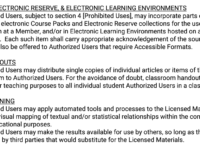Canadian copyright lobby groups have repeatedly tried to convince the government that the 2012 copyright reforms and Supreme Court fair dealing jurisprudence created a free-for-all in which education refuses to pay licence fees due to their reliance on fair dealing. The data from yesterday’s post on massive shift to site licences tells a different story, namely that Canadian educational institutions spend hundreds of millions annually on licences that provide both access works and the flexibility to use them in a myriad of ways. My Fair Dealing Week series on Canadian copyright, fair dealing and education (Setting the Record Straight) continues with another type of licence that has grown in importance in recent years: the pay-per-use or transactional licence. These licences, which grant access to, and use of, individual works, demonstrate that lobby group claims bear little relationship to reality. Indeed, if the lobby groups were right about unlimited uncompensated copying, why would education still spend millions a pay-per-use licences? They obviously wouldn’t, but since fair dealing represents a fair approach to both creators and users, education recognizes that fair dealing does not lead to the complete elimination of licensed copying.
Post Tagged with: "fair dealing"
Canadian Copyright, Fair Dealing and Education, Part Two: The Massive Shift to Electronic Licensing
Canadian copyright lobby groups have spent years falsely claiming that educational institutions refuse to pay for licences to compensate for the use of educational materials. This second post in my Fair Dealing Week series on Canadian copyright, fair dealing, and education focuses on this claim, which is a gross misrepresentation of the data (first post on Setting the Record Straight). The truth is that Canadian universities spend millions of dollars on licensing copyright materials. In fact, over the past decade, the emergence of site licenses that provide access to millions of works – books, journal articles, newspapers, and more – has led to huge increases in expenditures for access. Unlike copyright licences from copyright collectives such as Access Copyright, these digital licences provide both original access to works and the ability to use them in course materials. In the 1990s, a university would both purchase a book and pay for the right to copy a portion of it to distribute to students as course materials. Today, the university can use a single licence to gain access to the book and make it available as course material, handouts and for many other purposes since most digital licences facilitate access and permit multiple uses.
Canadian Copyright, Fair Dealing and Education, Part One: Setting the Record Straight
Canadian copyright lobby groups have relentlessly lobbied the government to overturn decades of Supreme Court of Canada jurisprudence, seeking unprecedented restrictions on fair dealing that include eliminating it for educational institutions if a licence is available. In doing so, they have relied on a steady diet of misleading claims about the state of the law, the licensing practices of Canadian educational institutions, the importance (or lack thereof) of copying of materials in course packs, and the effects of fair dealing. This week is Fair Dealing Week, which provides an opportunity to set the record straight on Canadian copyright and education, backed by actual data on what takes place on university campuses across the country.
This blog series starts with an introduction to the issue and follows with upcoming posts on the growth of digital licensing within higher education, the gradual disappearance of course packs, the emergence of open access, the huge expenditures on transactional licensing that demonstrate a commitment to pay for materials where fair dealing does not apply, and the actual role of fair dealing (rather the false caricature painted by lobby groups). I covered many of these issues in a series five years ago, titled Misleading on Fair Dealing. This series will update the data, demonstrating that far from refusing to pay licensing fees, universities have continued to spend hundreds of millions of dollars on licensing access to materials. I am grateful to University of Ottawa law students Ephraim Barrera and Brianna Workman for their assistance on this project.
Listen Up: My Recent Podcast Appearances on Bills C-11, C-18 and Canadian Copyright Law
Parliament remains on break for most of the month of January, but that hasn’t cooled interest in Bills C-11 and C-18. I’ve appeared on several podcasts in recent weeks on these bills that may interest. Last week, I was pleased to appear on CBC’s Front Burner for an episode titled “Will Canada Make Web Giants Pay For News?”. The discussion with host Jayme Poisson focused on the implications of paying for links, the inclusion of the CBC in the system, and potential alternatives that would mitigate against the harms created by the bill.
Why the Online News Act is a Bad Solution to a Real Problem, Part Four: Undermining Canadian Copyright Law and International Copyright Treaty Obligations
The series on why Bill C-18, the Online News Act, is a bad solution in search of a real problem has thus far focused on three issues: the risk to the free flow of information stemming from mandatory compensation for linking, how the bill encourages clickbait and other low quality news given the absence of standards in the definition of “news content”, and the unprecedented government intervention in a sector where independence is essential. Today’s post raises an unlikely issue given that Bill C-18 is the responsibility of Canadian Heritage Minister Pablo Rodriguez, who also has part responsibility for copyright law in Canada. Buried within the bill is Section 24, a short provision with big copyright implications:
For greater certainty, limitations and exceptions to copyright under the Copyright Act do not limit the scope of the bargaining process.
What does this mean and why is it in the bill?











